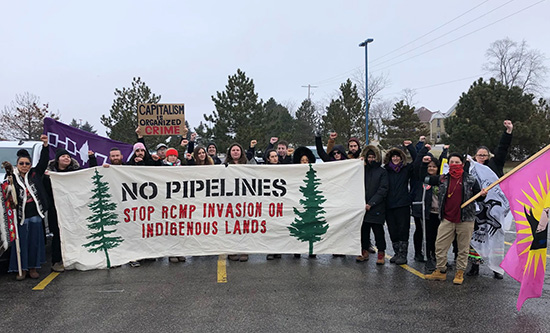
Contrary to Canada’s supposed reputation for being a promoter of human rights and environmental protection, Canadian capital’s willingness to trample on both nature and indigenous rights is as ruthless as that of any imperialist power. Canadian mining and oil companies have been engaged in constant attacks on the environment and indigenous protesters in their relentless pursuit of profit, both within Canada and globally.
A pitched battle is being fought in Canada over the construction of the Coastal Gaslink pipeline, a 670-kilometre pipeline costing $6.2bn dollars, which is set to run through the traditional lands of the Wet’suwet’en First Nations people. The pipeline is part of the largest fracking project in Canadian history, crossing 206 ecologically sensitive waterways and due to carry up to 2.1 billion cubic feet of methane gas daily. Despite pledges by the Canadian government to address climate change, such emissions-promoting infrastructure projects continue unabated.
In addition to the environmental impact of the project, the pipeline’s construction also undermines indigenous rights and sovereignty. The lands of the Wet’suwet’en peopleare unceded territory, meaning they cannot be used without the Wet’suwet’en people’s consent; this right was upheld by the Supreme Court of Canada in 1997, which ruled that the Wet’suwet’en held Aboriginal title over that land. However, Canadian capital cannot tolerate such limitations, even those supposedly enshrined in its own laws,
and TC Energy, the company that owns the pipeline, has pressed ahead with its construction anyway; in February 2023, TC celebrated 81% completion of the pipeline’s construction.
In response, the Wet’suwet’en people have organised land defender actions, physically erecting blockades and barriers preventing construction teams from accessing their land. These actions have been supported by waves of solidarity actions across the country, including a series of blockades and occupations of roads, trainlines, bridges, ports, and politicians’ offices in 2020. The response of the Canadian state has been predictably repressive; repeated raids by military police have attempted to intimidate and remove the land defenders, and several activists are facing charges relating to solidarity actions conducted over the last several years. As of December 2021, the Canadian police had spent over $21m on policing actions against the land defenders’ occupation.
Meanwhile, a series of oil spills in the nearby province of Alberta have illustrated the dangers such ravenous oil infrastructure poses to the environment and all who rely on it. Since May 2022, four separate tailings of toxic sludge have been recorded seeping into the nearby watershed from the Imperial Kearn mine tar sands project. This same project was additionally the site of a spill of 5.3 million litres of toxic tailings on 4 February 2023, one of the largest recorded oil spills in Alberta’s history. This has had a devastating impact on the nearby Athabasca Chipewyan First Nation community, whose traditional food supply has been compromised by the resulting environmental devastation. Neither the company responsible, Imperial Oil, nor the Alberta provincial government bothered to notify the local community about the ongoing tailings spills despite having known about the first of them as early as May 2022. Such inaction, along with the inadequate efforts to contain and clean up the spills, illustrate the dehumanising approach of Canadian corporations and politicians, who have shown they will always prioritise private profit over the wellbeing of people, especially First Nations people.
Canadian capital ravages abroad
Internationally, Canadian corporations are also some of the worst offenders when it comes to exploiting the environment and indigenous lands in other countries. As of 2019, 60% of the world’s mining companies had their headquarters in Canada. As part of their efforts to maintain their exploitative mining operations in oppressed countries, Canadian companies have been complicit in environmental destruction as well as political repression, murder, sexual violence, and forced migration against activists and indigenous peoples protesting against their activities.
One of the most notorious of these companies is Barrick Gold, which in recent years has been complicit in several acts of sexual violence and gang rape by militarised security guards at at least two mines it operates. In 2015 Barrick offered ‘remediation packages’ of between $10-15,000 to over 100 women and girls who had suffered such sexual violence at the Porgera Mine in Papua New Guinea – an amount which one of the victims, who refused the payment, described as ‘insulting’. That same mine was later the location of a further gang rape of three women by militarised police in March 2017; in response to those rapes being reported, 150 homes in the nearby village of Wangima were burned down by police. Barrick also operates the Veladero Mine in Argentina, which since 2015 has seen no less than five heavy metal spills which had a devastating impact on nearby waterways, wildlife, and residents. The first spill, in September 2015, is considered the worst environmental mining disaster in Argentina’s history.
Companies like Barrick are often able to evade any consequences for these abuses. The government of Papua New Guinea attempted to cut off Barrick’s access to the country by refusing to renew its mining permit in 2020, but Barrick responded by suing the government both in Papua New Guinea and at an international tribunal, causing the government to back down. Barrick’s reported revenue in 2022 was $11bn.
These corporate endeavours are backed by the power of the Canadian state, which for decades has eagerly played the role of junior partner to US imperialism on the world stage. Canadian foreign policy has supported imperialist ‘regime change’ efforts across the world, from Haiti to Libya, and Canada took a leading role in the Lima Group which attempted to overthrow the democratically-elected government of Venezuela in 2017. Canada’s foreign policy gladly supports such attacks on other countries’ sovereignty, knowing that Canadian companies will be invited to share in the exploitation of those countries’ resources that inevitably follows.
Wesam Cooley
FIGHT RACISM! FIGHT IMPERIALISM! 293 April/May 2023




